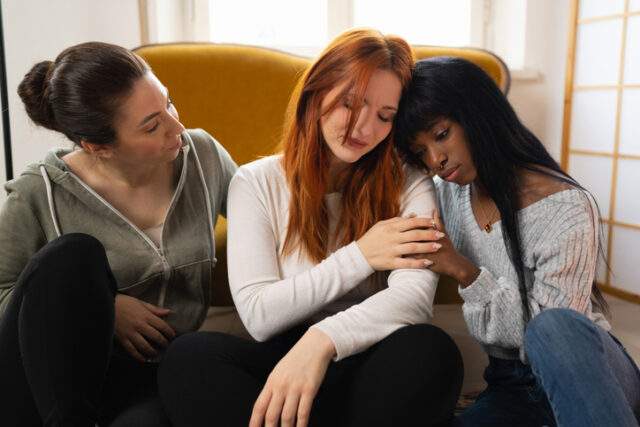While your friends and your partner don’t need to be thick as thieves, it’d be helpful (and a lot less awkward) if they got along.

However, not everyone is lucky enough to experience a harmonious relationship between the two. And when your friends really don’t like your partner, it can create a major headache with no real fix. The real question is, why? What is it about the person you’re in a relationship with that they hate? Here are some possible explanations.
1. Your partner doesn’t make an effort to engage with your friends.

If your partner consistently shows little interest in getting to know your friends or rarely participates in group conversations, it can create a barrier. Your friends might interpret this behaviour as standoffish or unfriendly, leading to a negative impression. Encourage your partner to get more involved sometimes — it can pay huge dividends in your social circle.
2. Your friends feel you’ve changed since being in the relationship.

Sometimes, being in a new relationship can lead to changes in behaviour or priorities. If your friends think that you’ve become less available, changed your personality, or abandoned some of the stuff you used to love/do together, they might attribute these changes to your partner’s influence. Balance is key!
3. Your partner has different values from your friend group.

Differing core values can create tension. If your partner’s beliefs or lifestyle choices clash massively with your friends’ (and yours, from their perspective), it might make them uncomfortable, and they’re bound to disapprove of the relationship. Obviously, everyone doesn’t need to have identical values, but finding common ground is important.
4. Your friends have witnessed concerning behaviour from your partner.

Friends often notice things we might overlook. If they’ve noticed your partner being disrespectful, manipulative, or exhibiting other sketchy behaviours, their dislike might stem from genuine concern for your well-being. It’s worth considering their perspective — don’t dismiss them outright!
5. Your partner monopolises your time.

If your friends feel that your partner demands too much of your attention, leaving little time for other relationships, it can create resentment. Again, finding a healthy balance between your romantic relationship and friendships is a must. Make sure you’re still making time for your friends and addressing their feelings of neglect.
6. There’s a clash of personalities between your partner and friends.

Sometimes, people simply don’t mesh well due to differing personalities. Your partner’s sense of humour, communication style, or general demeanour might not align with your friends’. You can’t force a connection, so it’s better not to push it.
7. Your friends feel your partner isn’t right for you.

Friends who know you well might have concerns about compatibility. If they feel your partner doesn’t complement your personality, support your goals, or bring out the best in you, they’re bound to disapprove. Consider their perspective, but remember that ultimately, you know your relationship best.
8. Your partner has said or done something offensive.

A single thoughtless comment or action can sometimes create a lasting negative impression. If your partner has offended your friends, even accidentally, it might be causing ongoing tension. Addressing the issue directly and encouraging your partner to apologise could help mend the relationship.
9. Your friends feel excluded from your life.

If you’ve massively reduced the time you spend with your friends or stopped sharing important parts of your life with them, they might feel pushed aside. Make an effort to include your friends in your life, share your experiences, and show that you still value their presence and input. They’re the ones who will be there for you should this relationship go south, after all!
10. Your partner is seen as controlling.

Friends might be wary if they see your partner as overly possessive or controlling. That could include monitoring your activities, discouraging your independent pursuits, or trying to influence your decisions. Think about whether these concerns have any merit and address any unhealthy dynamics in your relationship.
11. There’s a big age or lifestyle gap.

If there’s a considerable age difference or lifestyle disparity between your partner and your friends, it can create a disconnect. Different life stages or experiences might make it tough to relate. You’ll have to make a bit more effort to bring the two together.
12. Your friends are protective of you due to past experiences.

If you’ve had negative relationship experiences in the past, your friends might be extra cautious about your new partner. Their protectiveness, while well-intentioned, could manifest as dislike. Reassuring them about your current relationship and addressing their specific concerns might help alleviate their worries.
13. Your partner doesn’t respect your friendships.

If your partner frequently speaks negatively about your friends, discourages you from spending time with them, or doesn’t respect the importance of these relationships in your life, it can create tension. Emphasise the value of your friendships to your partner and encourage a more supportive attitude.
14. There’s unresolved conflict between your partner and friends.

Past disagreements or misunderstandings that haven’t been properly addressed can lead to ongoing dislike. If there’s been a specific incident causing tension, facilitating a conversation to clear the air and resolve any lingering issues could improve the situation.
15. Your friends feel your partner is not supportive of your goals.

If your friends perceive that your partner doesn’t encourage your ambitions or support your personal growth, it might lead to disapproval. They may worry that the relationship is holding you back. Discuss these concerns with your partner and ensure you’re both supportive of each other’s aspirations.
16. Your partner’s presence has changed the group dynamic.

Introducing a new person into an established friend group can alter the dynamic. If your friends feel that gatherings are less enjoyable or authentic when your partner is present, it might create resistance. Gradually integrating your partner into different social settings and encouraging natural interactions could help smooth this transition.




